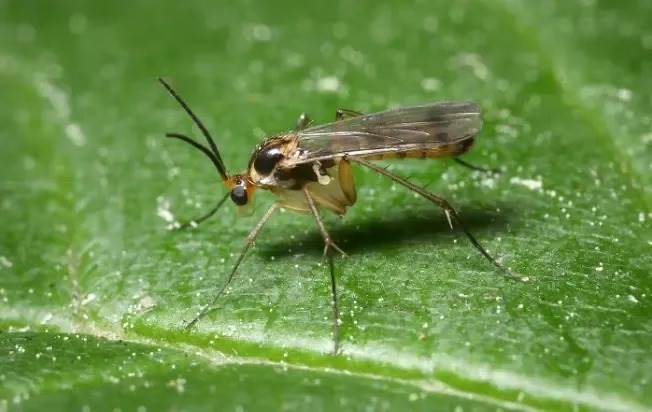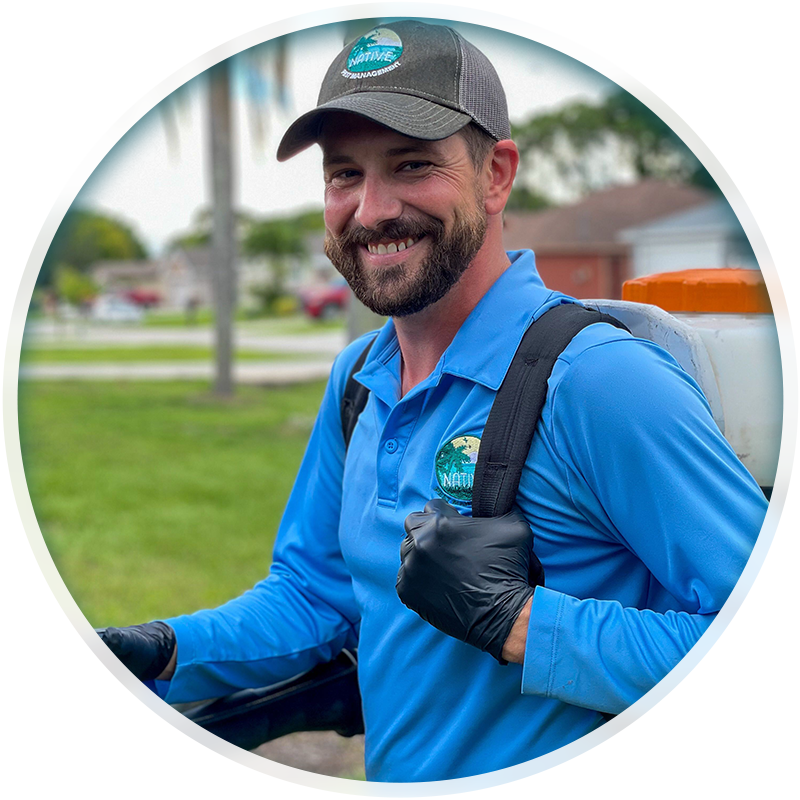
Fungus Gnats in South Florida
Identifying Fungus Gnats in South Florida

Fungus gnats are more than just a nuisance invading your gardens and homes in Florida. These tiny, dark-winged insects, thriving in moist soil and organic matter, challenge plant enthusiasts and everyday people alike. This article will delve into the fungus gnats’ unique world – from their appearance and life cycle to exploring effective pest management strategies.
Key Takeaways
- Gnats thrive in moisture-rich environments, posing challenges to plants and people.
- Florida hosts various fungus gnat species, including dark-winged, long-legged, and greenhouse gnats.
- Pest control methods encompass cultural, biological, and chemical approaches, emphasizing the importance of smart gardening, natural enemies, and judicious chemical use.
Biology and Identification
Life Cycle
The life cycle of a fungus gnat consists of four stages: eggs, larvae, pupae, and adults. Each stage is crucial in the development of these insects.
- Eggs: Female fungus gnats lay tiny, white eggs in moist soil or other damp organic matter. Approximately 100-200 eggs are laid at a time, which hatch in 4-6 days.
- Larvae: The larval stage lasts 12-14 days and involves the larvae feeding on organic material in the soil, such as fungi and decaying plants. Larvae are transparent and can be recognized by their black-headed capsules.
- Pupa: After the larval stage, the larvae form a pupa, which is a resting stage. Pupation lasts for 3-7 days before the adult fungus gnat emerges.
- Adult: Adult fungus gnats are small, delicate insects with slender legs and wings. They have a short life span of about 7-10 days, during which they mate and lay eggs to continue their life cycle.
The adult stage is particularly crucial as this is when mating occurs, a critical step in the continuation of the fungus gnat population. These adults are known for their characteristic mating swarms, often seen in large numbers hovering near plant soil. After mating, females seek suitable moist environments to lay their eggs, thus beginning the cycle anew.
Common Species and Appearance
Florida is home to various fungus gnat species, each with unique characteristics. Here are some of the more common types you might encounter:
- Dark-Winged Fungus Gnats (Bradysia spp.): These gnats are typically 2-3 mm in size, with grayish-black bodies, long antennae, and Y-shaped wing veins. They are commonly found in Florida.
- Long-Legged Fungus Gnats (Sciara spp.): Usually around 4-5 mm in size, these dark-colored gnats have long legs and are often found near decaying organic matter. They can also be commonly seen in Florida.
- Greenhouse Fungus Gnats (Lycoriella spp.): Small, typically under 3 mm, with dark and slender bodies, these gnats are frequently found in greenhouse environments in Florida.
Habitat and Behavior
Preferred Environment
Fungus gnats thrive in environments with moist soil and abundant organic matter. They are commonly found in Florida greenhouses and other areas with high humidity. Overwatering in these environments can exacerbate the problem as it provides an ideal breeding ground for the gnats.
In addition to greenhouses, fungus gnats can be found in:
- Potted plants
- Garden beds
- Compost piles
These environments offer ample organic matter and moisture, perfect for the growth and development of the fungus gnats.
Impact on Plants and Ecosystem
Plant Damage
Fungus gnats are known to cause significant damage to potted plants, houseplants, and greenhouse plants. Their larvae primarily feed on the root and stem tissue of various plant species, particularly young plants. The damage caused by these pests can result in stunted growth, wilting, yellowing of leaves, or plant death.
Some common signs of infestation include:
- Visible adult gnats around plants
- Presence of larvae in the soil
- Loss of vigor in plants
Ecosystem Effects
Fungus gnats play different roles in various ecosystems:
- Indoor Ecosystems: In homes, greenhouses, and other indoor environments where plants are grown, fungus gnats can be a common pest. They typically thrive in moist conditions, especially overwatered or poorly drained soils. They can harm young plants or seedlings by feeding on their roots, potentially impacting plant health and growth.
- Natural Ecosystems: In outdoor environments like forests and wetlands, fungus gnats are a part of the natural ecosystem. Their impact is generally limited; they contribute to the decomposition process by feeding on fungi and decaying organic matter. In these settings, they're considered part of the ecological balance, rarely causing significant harm to healthy plants.
Basically, while fungus gnats can concern plant health in controlled environments like greenhouses, their role in natural ecosystems is typically benign and part of the natural ecological processes.
Prevention and Control
Cultural Control
For those who care for plants, a dual approach is essential for pest management. Cultural control involves adjusting gardening practices to naturally deter pests like fungus gnats, complemented by smart water management to control soil moisture levels.
Some essential tips include:
- Keep It Clean: Regularly remove plant debris to minimize fungal growth, reducing attractive conditions for gnats.
- Quarantine and Crop Rotation: Introduce new plants cautiously to prevent gnat spread and rotate crops to disrupt their lifecycle.
- Regulate Watering: Avoid overwatering. Let the soil's top layer dry before re-watering.
- Improve Soil Drainage: Choose well-draining soil and avoid pot saucers that trap water, which create a prime breeding site for gnats.
Biological Control
If cultural control isn’t enough or irrelevant, then biological control can help. This approach emphasizes natural enemies and beneficial microbes to keep those gnat numbers down. It’s effective, eco-friendly, and lets you skip the harsh chemicals.
Here are some of the most effective biological control methods:
- Nematodes: Employ nematodes (Steinernema feltiae), which are known for their efficacy against fungus gnat larvae. These microscopic worms invade the larvae, releasing bacteria that fatally infect the pests, reducing their numbers in the soil.
- Predatory Mites: Introduce predatory mites (Hypoaspis miles or Hypoaspis aculeifer) to your plant environments. These mites naturally feed on fungus gnat larvae, significantly diminishing gnat populations.
- Biological Insecticides: Use Bti (Bacillus thuringiensis var. israelensis), a natural insecticide, as another line of defense. When applied to the soil, Bti targets and disrupts the larval stage of fungus gnats, preventing their development into adult gnats.
Chemical Control
When cultural and biological methods are insufficient, chemical control may be necessary. However, it is essential to use pesticides judiciously to minimize the potential for resistance development and harmful effects on non-target organisms.
Chemical control options include:
- Insecticides: Apply contact insecticides, such as pyrethroids or pyrethrins, to the soil surface or foliage where adult gnats are found. This can help reduce the adult population and decrease egg-laying activity.
- Larvicides: To target larvae in the soil, apply larvicides like cyromazine or diflubenzuron, which specifically target the larval stage of insects. These chemicals interfere with the insect’s growth and development, ultimately preventing adult emergence.

Why Choose Native Pest Management?
We Exceed Customer Expectations
-
Pet Friendly & Environmentally ConsciousNative Pest Management applies our pest control products with the safety of your family and pets in mind! We also offer eco-friendly pest control to protect your family and the planet.
-
Local Service ProfessionalsSince 2015, we have served communities in West Palm Beach and all throughout South Florida. Our team is fully licensed, insured, and vetted.
-
On TimeOur team will not only arrive on time, but they’ll also go above and beyond when providing service. It’s what makes us one of the top rated pest control companies in Florida! We strive for complete customer satisfaction every time.
-
Get a 100% Free Estimate
Whether you currently have pests in your home or simply want to start professional pest prevention, take the first step to a pest-free life, and contact us today for your free pet-friendly pest control quote.
-
“Warren took his time with the servicing and was very knowledgeable! Exceptional customer service. I will be requesting him each time.”- Montiea Singletary
-
“Excellent service by Chino from Native Pest Management. Chino went above and beyond to make sure we understood everything about the service and kept us very informed during the process.”- Brand Gonzalez
-
“Truly professionals at what they do. very respectful very knowledgeable and great attitude.”- Jorge Acosta
-
“I called and spoke to the manager, who was polite and courteous, and even though it cost them money to come back out and spray, they did not charge me again, and I was very thankful.”- S. Williams
-
“Dale is the absolute best in the business of pests! My sister and I personally ask for him every single time because he always goes above and beyond.”- Zariah Graham
-
“The technician was very professional. He explained things thoroughly and put me at ease with what was about to happen in my home.”- Anthony Diaz
-
“Native pest management always exceeds my expectations! The people who answer the phone are so nice and accommodating and make scheduling a breeze! The techs are always so nice and do a great job.”- Michelle Cato
-
“Extremely impressed with the technicians I met today. Tony and Jamie. Very thorough and customer oriented. I am expecting great things for my trees and plants.”- Curt Kredo

Native Pest Management's Blog
Want all the latest news or updates? Browse through our blog to read our most recent posts and featured articles.







